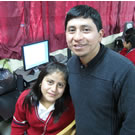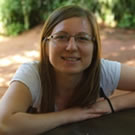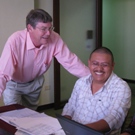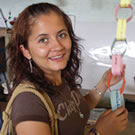OL 201 Designing and Funding Non Profit Programs
Online Nonprofit Training Certificate: 8 Weeks
Learn How to Design, Fund and Manage Non Profit Programs in OL 201—Course One—of the Nonprofit Management Certificate-Design Fund & Manage Programs.
Expand on this online training certificate to Design Nonprofit Programs
through a four course diploma, a live workshop, or a one-on-one mentored program.
Current start dates for this non profit programs certificate are listed in the sidebar.
| Develop Real Non Profit Programs with your own CSDi Coach and Mentor. Learn more about program fees and how to enroll here: |  |
|
Skills you will Learn:
Great Program Design + New Donations = Increased Services Develop a winning, impact oriented project while learning to:
|
|
Who Should Join?
Advance your Career, Raise Funds, Solve Challenges Online Training: The program is for non profit staff and job-seekers wanting to successfully solve community challenges and fund programs. Participants have worked on nonprofit programs as diverse as social services, community development, education, the environment, and social justice—and decided to enroll in the program because they were:
|
What you will Do:
Create your Own Nonprofit Program Design & Attract Donors The course provides cutting-edge information, tools, time-saving templates, training and expert consultancy—and leads you in developing a real project for your organization. You will:
This 8-week course is $150.00 and begins the first of each month.
|
What Participants Say:
“I just want to take this opportunity to complement you on the practical ideas, knowledge and vast experience that you continue to share with us on each assignment. Many times your examples are the solution of choice for our community. I have been provided with constant support, practical solutions suitable for my project, feedback specific to our project submissions and unwavering encouragement.” Gillian Primus
“I just want to take this opportunity to complement you on the practical ideas, knowledge and vast experience that you continue to share with us on each assignment. Many times your examples are the solution of choice for our community. I have been provided with constant support, practical solutions suitable for my project, feedback specific to our project submissions and unwavering encouragement.” Gillian Primus
“Thank you for all your effort in putting together a great program and all of the program resources. Thank you for everything – for making this possible, for your guidance, and for your continuous optimism and encouragement. I look forward to the opportunity to work with you again in the next session.” Wye Yee Yong.
| Subscribe! Join a community of nonprofit communication specialists to get cutting-edge articles on advancing your career, raising more funds, and connecting with donors . |  |
Links to OL 201 How to Design & Fund Non Profit Programs:
Detailed Course Description: OL 201 How to Design & Fund Non Profit Programs
Nonprofit Management Certification. Our annual survey for non profit professionals showed their three top concerns:
- how to design sustainable projects that would effectively solve community challenges
- not having enough funds to accomplish all of their organizational goals
- not having enough time to get everything done
They also felt that better project design would attract non profit donors and increase donations.
This is exactly what we do in OL 201 and OL 202:
- learn how to develop a real project designed to solve community challenges with sustainable outcomes
- develop nonprofit project management tools to ensure greater successes
- increase funding: package the project concept for presentation to donors
- use step-by-step templates provided in the course to speed up the process and save you time
If you work with non profit programs such as animal welfare, community development, the environment—or a food bank or homeless shelter—the Diploma Program 240 will help you develop sustainable, fundable, impact oriented projects. This Course, OL 201, is the first course of the diploma series.
Nonprofit Training: Non profit organizational effectiveness can be limited by non profit staff’s poor access to mission-critical information and training. We deliver solutions by providing cutting-edge information, tools, time-saving templates, training and expert consultancy through blending direct communication in our distance learning programs—and lead you in developing a real project for your organization.
Projects that participants have developed have included activities for the elderly, adaptation to climate change, alternative energy, bicycle paths, business skills training for immigrants, community development, conservation, elderly care facilities, financial literacy, formation of a farmer’s association, natural resource management, recycling, revitalization of an Iowa town, income generation, and vocational skills training.
Although most participants in these non profit programs are from North America or the U.K, we have had the pleasure of also working with non profit participants from: Australia, Austria, Belgium, Canada, Denmark, Finland, France, Germany, Hong Kong, Ireland, Italy, Japan, Monaco, the Netherlands, New Zealand, Norway, Spain, Switzerland, the United Kingdom, and the United States.
Become the Solution
- Community engagement: Empower people in your communities to change their lives,
- develop nonprofit project design from the ground-up,
- use proven methods that produce sustainable results, and
- attract donors.
Real Projects in Real Communities. Our Distance Learning Courses are for staff from non profit and donor organizations—and people interested in the non profit world. They present an online field experience and lead participants in the process of developing empowered, sustainable communities. Online course participants learn to develop real projects in real communities.
What is a Community? Examples of communities could be:
- urban agriculturalists
- teenagers visiting a teen drop-in center
- people visiting a food bank
- recent immigrants learning to navigate a new country and a new culture
- members of a town developing a trail system in an adjacent wilderness area
- members of a small town in Nebraska in the process of revitalizing it
- citizens trying to fund a community health center
- local farmers forming a marketing association
- farmers benefiting from ecosystem services on an environmental restoration project
- young families in need of day care
Field Work: Don’t have community access? No problem: we partner you with a fellow student who does.
| Overview |
OL 201: How to Design & Fund Non Profit Programs
|
 |
The course will lead you through the development of a real project, in real time, and leave you with the practical tools to sustain it.
We are committed to results-based programs. You will learn to incorporate community-identified need into the design of your project and research project activities that have shown evidence of having worked at solving challenges.
|
You will use contemporary methods nonprofit program management. You will gain practical field experience using evidence-based activities by developing a real project in real-time.
| Student Projects | Become the Solution |
 |
For example, student projects have included efforts to help communities in Europe and North America with community building, community organizing, economic development, youth employment, income generation, empowering women, the Inuit and climate change, and environmental restoration. The course will lead you through the development of similar real projects, in real time, in your region.
|
| Course Outline | Designing and Funding Non Profit Programs |
 |
Course facilitators have gained their expertise providing face-to-face non profit consulting services to non profits working in in the field. Your course facilitator will also provide you with personalized consulting to ensure your project has a solid beginning.
|
4. refine your project and share it with your community, and
5. share your project concept with a potential donor. See the full course syllabus.
OL 201 will be led by Tim Magee who has over 30 years experience in both working with non profits and leading non profit management training workshops. Mr. Magee is the author of A Field Guide to Community Based Adaptation published by Routledge, Oxford, England. Through this program Mr. Magee will give you dedicated help in:
- Improving project design, management, project impact and sustainability
- Increasing funding levels by creating better communication and engagement with donors
| Requirements | |
 |
|
Non Profit Program Planning: OL 201 Course Syllabus How to Design & Fund Non Profit Programs
- Week 1 Learn to navigate the course website, download the week’s documents, and form partnerships.
- Week 2 & 3 Clearly identify the community that you hope to work with in the nonprofit needs assessment. Read the document on participatory needs assessments and conduct an informal assessment with a few community members to uncover a real challenge. List the needs identified and organize them into a clearly described nonprofit challenge that you are going to solve with your project design. We want this as real as possible.
- Week 4 Develop a theory of how you plan to solve your new challenge, and research 3 solution-oriented activities that would fulfill the premise of your theory.
- Week 5 Research one peer-reviewed paper for each of your three project activities and see if scientists have found evidence that your proposed activities have been effective in solving the challenge. Write a one paragraph summary of the papers’ findings.
- Week 6
- Share your proposed project concept locally with colleagues to gain feedback and constructive criticism.
- Return to the community with your project concept and get their feedback and hopeful buy-in.
- Pick one of your evidence-based activities and write a simple one page guide on how a field staff person could implement it.
- Week 7 Write a workshop lesson plan for introducing this activity into a community, and then make an illustrated, How-to card to give to community members.
- Week 8
- Share your project with someone that you would like to sell it to: a donor, your boss, your professor, someone in the development/nonprofit world for feedback.
- Lay out your challenge, proposed solutions, and activities in a simple matrix (logistic framework) that I will supply. This will prepare you for the next course: OL 202 where you will transform your project into a set of management documents that can formally be presented for funding.
How to Enroll in the OL 201 Certificate Course.Two simple steps and you’re in!Develop Real Non Profit Programs with your own CSDi Coach and Mentor.
 It’s easy to enroll in our courses. There are only two things to do: pay the course fee and fill out the student information form.OL 201 is the first course of the OL 240 Diploma Program on non profit project management
It’s easy to enroll in our courses. There are only two things to do: pay the course fee and fill out the student information form.OL 201 is the first course of the OL 240 Diploma Program on non profit project management
—and can be taken as a single, self contained, 8 week certificate course.If you are interested in receiving the diploma, it is composed of four, 8-week courses. Start your diploma program with this course, OL 201. The four courses are taken sequentially as your project develops from one course to the next.Each of the four courses is $150.00 and all four courses can be completed in 8 months.Simply click on the “Enroll Now” button to pay the course fee.Then, fill out the Student Information form at the bottom of the enrollment page to complete enrollment.We will quickly send you a confirmation email. You will receive your login instructions on the Monday the course begins. Courses start at the beginning of each month. Exact start dates are in the right-hand column on the ‘Enroll Now’ page.In the next course, the second course of the series, OL 202: Project Architecture: Planning for Impact, you will transform your project with the real nonprofit management tools of a logframe, a budget, and a fact sheet (letter of inquiry) into a project ready to formally present to a donor.Non Profit Certifications. Course participants who successfully complete the course on time will receive a course certificate by email within 30 days of course completion.If you have a question don’t hesitate to contact us at: Online.Learning@csd-i.org.
